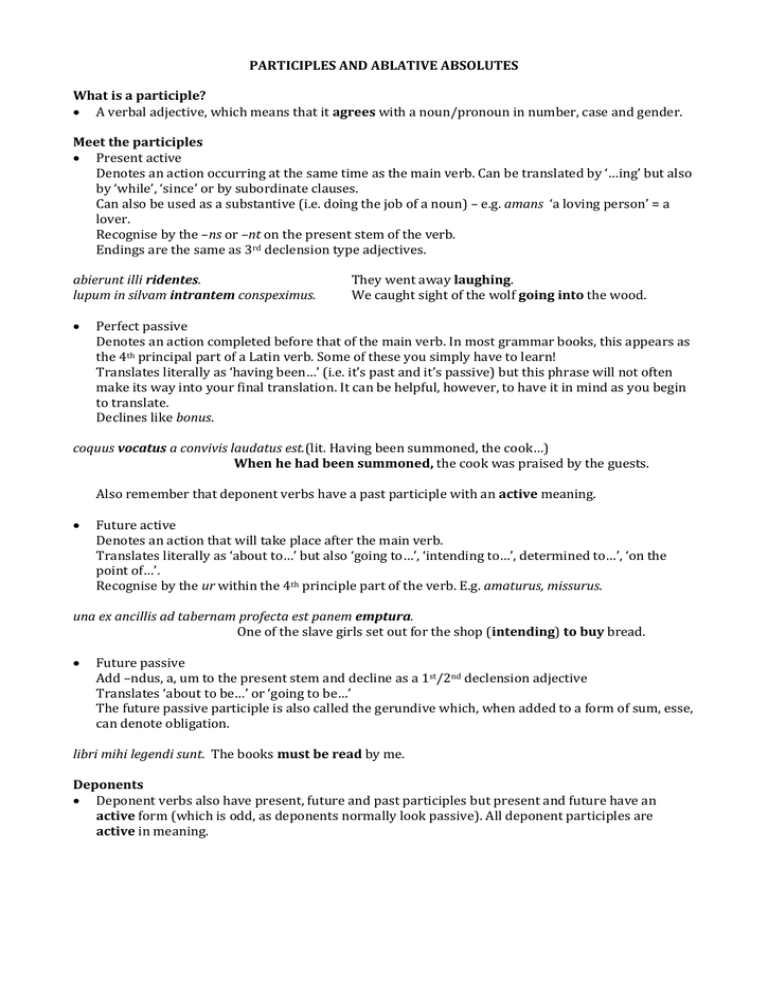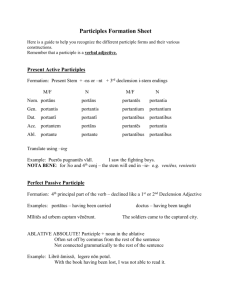agrees Present active
advertisement

PARTICIPLES AND ABLATIVE ABSOLUTES What is a participle? A verbal adjective, which means that it agrees with a noun/pronoun in number, case and gender. Meet the participles Present active Denotes an action occurring at the same time as the main verb. Can be translated by ‘…ing’ but also by ‘while’, ‘since’ or by subordinate clauses. Can also be used as a substantive (i.e. doing the job of a noun) – e.g. amans ‘a loving person’ = a lover. Recognise by the –ns or –nt on the present stem of the verb. Endings are the same as 3rd declension type adjectives. abierunt illi ridentes. lupum in silvam intrantem conspeximus. They went away laughing. We caught sight of the wolf going into the wood. Perfect passive Denotes an action completed before that of the main verb. In most grammar books, this appears as the 4th principal part of a Latin verb. Some of these you simply have to learn! Translates literally as ‘having been…’ (i.e. it’s past and it’s passive) but this phrase will not often make its way into your final translation. It can be helpful, however, to have it in mind as you begin to translate. Declines like bonus. coquus vocatus a convivis laudatus est.(lit. Having been summoned, the cook…) When he had been summoned, the cook was praised by the guests. Also remember that deponent verbs have a past participle with an active meaning. Future active Denotes an action that will take place after the main verb. Translates literally as ‘about to…’ but also ‘going to…’, ‘intending to…’, determined to…’, ‘on the point of…’. Recognise by the ur within the 4th principle part of the verb. E.g. amaturus, missurus. una ex ancillis ad tabernam profecta est panem emptura. One of the slave girls set out for the shop (intending) to buy bread. Future passive Add –ndus, a, um to the present stem and decline as a 1st/2nd declension adjective Translates ‘about to be…’ or ‘going to be…’ The future passive participle is also called the gerundive which, when added to a form of sum, esse, can denote obligation. libri mihi legendi sunt. The books must be read by me. Deponents Deponent verbs also have present, future and past participles but present and future have an active form (which is odd, as deponents normally look passive). All deponent participles are active in meaning. ACTIVE PASSIVE PRESENT amans, amantis loving ---------------- PERFECT ------------------ amatus,a,um having been loved FUTURE amaturus,a,um about to/going to love amandus,a,um about to/going to be loved And some to try… 1. lupum in silvam intrantem conspeximus. 2. ei roganti respondere semper conor. 3. multi ex adstantibus lacrimabant. 4. legatus a feminis e foro festinantibus visus est. 5. Hannibal hostes castra posituros spectavit. 6. librum a te mihi datum non legam. 7. servus inventus domum quam celerrime missus est. 8. leo sublatum pedem mihi ostendit. ABLATIVE ABSOLUTE What is it? When a noun (or pronoun) is linked with a participle and both are in the ablative. It is a very common usage of the participle. It is called the ablative absolute because the phrase is freestanding and has no grammatical connection with the rest of the sentence.. It is used to state the circumstances under which the action of the main verb took place, a kind of ‘setting the scene’ for what follows. The participle can be in any of the 3 tenses but futures are extremely rare. Much easier to spot than it is to explain! What does it mean? Present participle The best translation is likely to be something like ‘when’ or ‘while’. puella spectante, pater discessit. Since there is no present participle in Latin for the verb “to be”, one occasonally finds ablative absolutes without the participle, as in this example: Caesare duce, vincemus. (lit.) While the girl was watching, her father left. With the girl watching, the father left. With Caesar being leader, we shall conquer. With Caesar as leader, we shall conquer. Perfect participle This is the one you will see most as it helps compensate for the lack of a perfect active participle. So, for example, when a Roman wanted to say: ‘Having received the letter, Caesar sent a messenger.’ he had no straightforward way of doing so. Instead, he uses an ablative absolute: Caesar, acceptis litteris, nuntium misit. Caesar, when he had received the letter, sent a messenger. Of course, if you happen to be dealing with a deponent verb, this difficulty does not arise. Deponents can still be used in ablative absolutes. oratore locuto, cives inter se loquebantur. After the orator had spoken, the citizens talked among themselves. Future participle oratore locuturo, cives conticuerunt. Since the orator was going to speak, the citizens fell silent. And some to try… 1. libris a pueris lectis, magister hanc fabulam eis narravit. 2. domino interfecto, servus effugit. 3. ille, capto vino, senatori dicebat. 4. leone viso, in speluncam (cave) confugi metu tremens; postea animo recuperato domum quam celerrime cucurri. 5. sene dormiente, servi in viam exierunt ridentes ac cantantes. 6. leone a milite occiso, omnes cives gaudebant. 7. poeta sic locuto, cives magnopere timebant. 8. magistro intrante, pueri tacuerunt.






